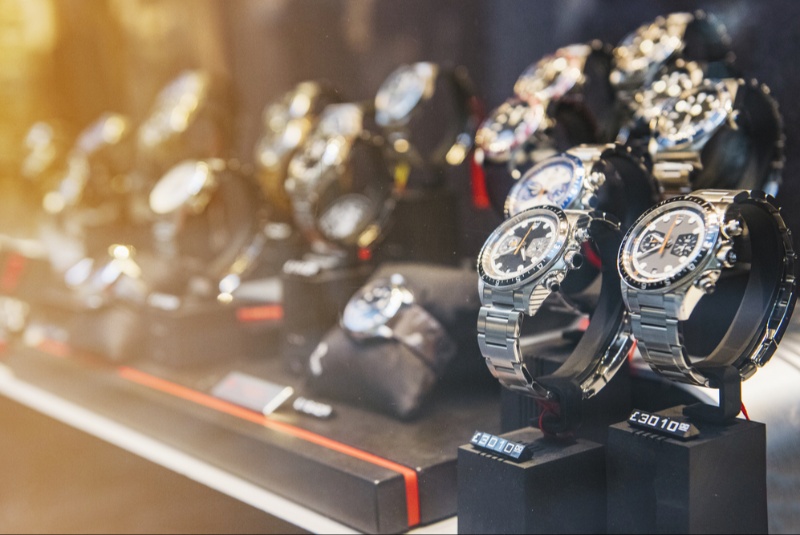When it comes to luxury accessories, few items exude elegance and prestige quite like a luxury watch. Whether you're a seasoned collector or a first-time buyer, selecting the perfect luxury watch is an art in itself. In this article, we will guide you through the process of making a smart purchase, ensuring that you not only acquire a timepiece of exceptional craftsmanship but also make a wise investment.
Understanding Your Budget
Before diving into the world of luxury watches, it's crucial to establish your budget. Luxury watches come in a wide range of prices, from a few thousand dollars to several million. Determine how much you're willing to spend, keeping in mind that this is an investment in both style and craftsmanship.
Researching Watch Brands
Not all luxury watch brands are created equal. Some have centuries-old legacies, while others are relatively newcomers. Research various watch brands to understand their history, reputation, and the types of timepieces they offer. This will help you narrow down your options and find a brand that resonates with your style and values.
Exploring Watch Styles
Classic vs. Contemporary
Luxury watches come in a variety of styles, ranging from classic to contemporary. Classic designs often feature timeless elements such as Roman numerals and leather straps, while contemporary watches may incorporate modern materials and bold aesthetics. Consider your personal style and preferences when choosing between these two categories.
Dress vs. Sport Watches
Another important distinction is between dress watches and sport watches. Dress watches are typically sleek and understated, suitable for formal occasions. On the other hand, sport watches are more robust and equipped with features like water resistance and durability, making them ideal for active lifestyles.
Examining Watch Features
To make an informed decision, you'll want to understand the features and complications that luxury watches can offer.
Movements
Luxury watches use various types of movements, including automatic (self-winding), manual, and quartz. Each has its advantages and characteristics. Automatic movements, for example, are prized for their craftsmanship and require no battery, relying on wrist motion to power the watch.
Complications
Complications refer to any additional features beyond basic timekeeping. These can include chronographs, moon phases, tourbillons, and more. Consider which complications are essential for your needs and preferences.
Evaluating Materials and Craftsmanship
Materials
The materials used in luxury watchmaking significantly impact the watch's aesthetics, durability, and value. Common materials include stainless steel, precious metals like gold and platinum, and exotic materials like titanium or ceramic. Understand the advantages and drawbacks of each material before making your choice.
Craftsmanship
Examine the level of craftsmanship involved in creating the watch. Handcrafted watches often have more intricate detailing and are considered works of art. Look for hallmarks of quality, such as precision in the movement and the attention to detail in the design.
Checking Authenticity and Certification
Authorized Dealers
To ensure you're purchasing an authentic luxury watch, buy from authorized dealers or directly from the brand's boutiques. Beware of unauthorized sellers and counterfeit watches, as they can lead to disappointment and financial loss.
Certification
Many luxury watches come with certificates of authenticity and serial numbers. Verify the watch's authenticity by checking these details and ensuring they match the brand's records.

Considering Resale Value
While buying a luxury watch is a rewarding experience, it's essential to think about its potential resale value. Some watch brands and models hold their value better than others. Research the resale market and consider factors like limited editions and historical significance.
Considering the Investment Potential
Limited Editions and Rarity
When selecting a luxury watch, consider the potential investment value. Limited-edition watches and those with unique features often appreciate in value over time. Research the watch's rarity and the brand's track record for creating collectible timepieces. Investing in a watch that may increase in value can be an attractive proposition for many buyers.
Historical Significance
Some luxury watches gain value due to their historical significance. Certain models have played essential roles in horological history, breaking records or introducing groundbreaking innovations. Owning a watch with a notable past can make your purchase even more rewarding, both as a collector's item and a conversation piece.
Maintenance and Servicing
Regular Maintenance
To ensure your luxury watch retains its value and functionality, it's essential to schedule regular maintenance with a certified watchmaker. This includes cleaning, lubrication, and adjustments to keep the movement accurate. Neglecting maintenance can lead to costly repairs or diminished resale value.
Servicing Records
Maintain meticulous records of your watch's servicing and repairs. These documents can add to its authenticity and enhance its resale value. When selling your watch in the future, potential buyers may appreciate knowing that the watch has been well cared for throughout its life.
Warranty and After-Sales Support
Manufacturer's Warranty
Check the manufacturer's warranty for your luxury watch. Many brands offer warranties that cover manufacturing defects for a specified period. Understanding the warranty terms and conditions will provide peace of mind in case any issues arise.
After-Sales Support
Consider the after-sales support offered by the brand. Reputable luxury watchmakers often provide excellent customer service, including access to skilled watchmakers and genuine replacement parts. This support can be crucial in maintaining your watch's long-term value.
Selecting a luxury watch is a multifaceted process that involves understanding your budget, researching brands, exploring styles, examining features, evaluating materials and craftsmanship, checking authenticity, considering resale value, assessing investment potential, and planning for maintenance and after-sales support. By following these comprehensive guidelines and being a discerning buyer, you'll not only make a smart purchase but also enjoy the long-lasting benefits of owning a luxury timepiece.
Remember that a luxury watch is more than just a timekeeping device; it's a statement of your style, taste, and appreciation for exquisite craftsmanship. Make your selection wisely, and your luxury watch will become a cherished companion, a potential investment, and a valuable heirloom for generations to come.




